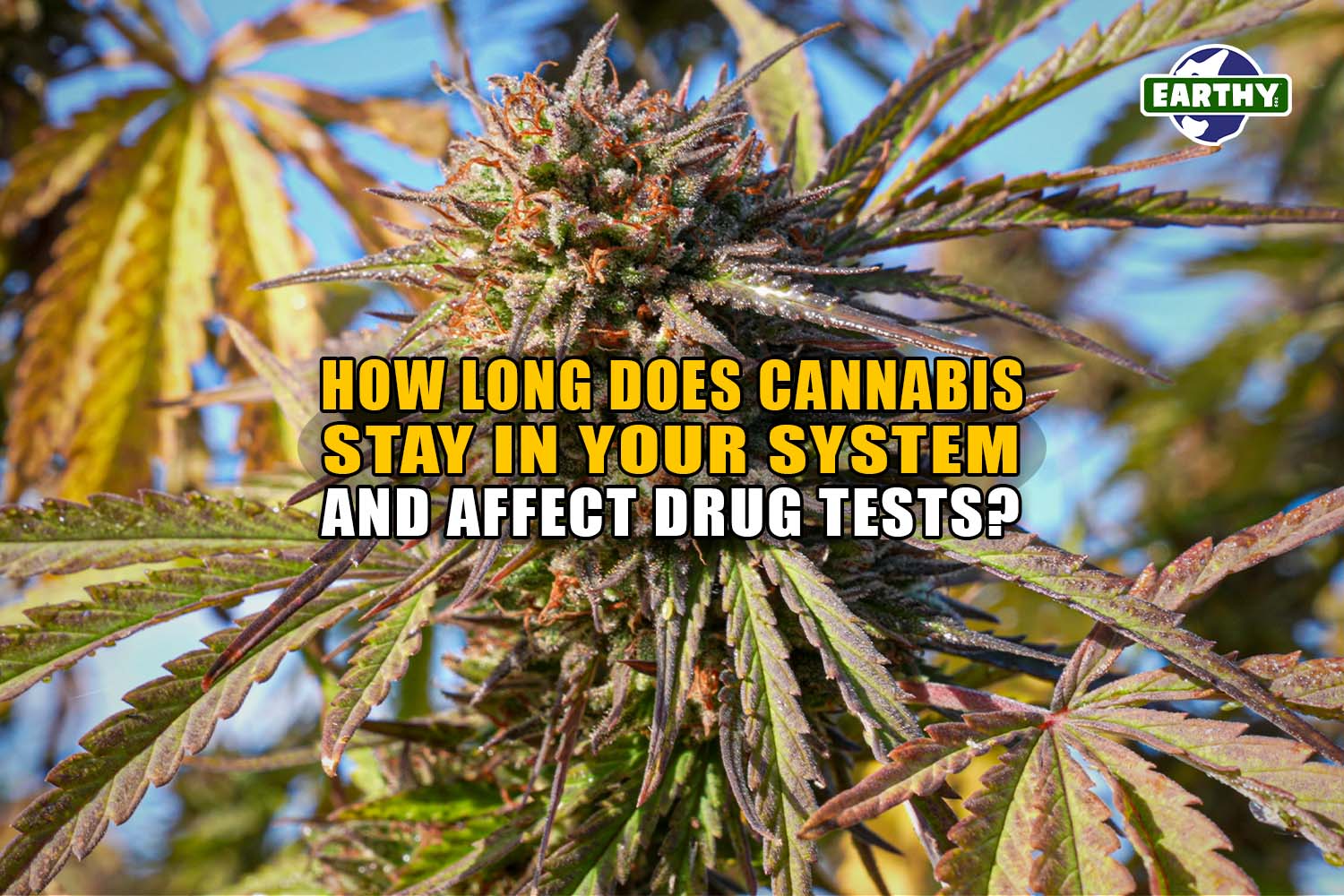Cannabis generally contains some amount (even a trace amount) of Delta-9 THC, the psychoactive substance used widely, both recreationally and medicinally [1]. So many users want to understand how long THC stays in your system. The truth is, various factors influence the duration of how long cannabis metabolites remain detectable in the body. These metabolites can directly impact drug testing outcomes [2]. To shed light on this situation, this article delves into the metabolism of cannabis, the detection windows of different drug tests, and the variables affecting how long weed stays in your system.
Metabolism of cannabis in the body
When you consume marijuana or hemp, whether by smoking or otherwise ingesting the cannabis, the body metabolizes its active compounds, primarily THC (tetrahydrocannabinol). THC is the psychoactive component responsible for the “high” associated with cannabis use. Once THC enters the bloodstream, the liver breaks it down into metabolites, including THC-COOH, which are stored in fat cells [3].
Typically, the body processes THC differently depending on several factors. For example, the variables influencing THC metabolism include body mass index (BMI) and frequency of THC use. More specifically, chronic users, or those who consume marijuana regularly, tend to retain THC metabolites longer than occasional users [4].
To be clear, there are different types of THC, each a separate cannabinoid, ie Delta-9 THC, Delta-8 THC, etc. Delta-9 THC is the one that is regulated by various federal and state laws, and thus is the usual target of drug tests for marijuana or cannabis. However, some cannabinoids have similar chemical properties to Delta-9 in that they produce psychoactivity.
Note that tests may not be sophisticated enough to distinguish between THC metabolites resulting from different THC types.
Influencing factors: how long does cannabis stay in your system?
1. Frequency of use: Chronic cannabis use leads to a buildup of THC metabolites in the body, resulting in longer detection times. Infrequent users may eliminate THC faster [2].
2. Method of consumption: Smoking cannabis results in a rapid increase in blood THC levels, while edibles cause a slower, prolonged release of THC into the bloodstream [2].
3. Dosage and potency: Higher doses and more potent cannabis strains increase the amount of THC in the system, extending detection times [2].
4. Individual differences: Factors like metabolism, body fat percentage, age, and overall health can influence how quickly the body processes and eliminates THC. For example, individuals with more body fat may retain THC metabolites longer due to their storage in fatty tissues [2].
Understanding the Potency and Ingredients of Pet CBD Products
Detection windows for different drug tests
1. Urine tests: These are the most common form of cannabis drug testing. Notably, THC metabolites remain in urine for varying lengths of time:
- Occasional users: 3 to 7 days
- Regular users: 1 to 3 weeks
- Chronic users: up to 30 days or more [5]
2. Blood tests: Lab professionals can detect THC in blood tests, yet the detection time is shorter than with urine tests. Thus, blood tests are less common due to their shorter detection window:
- Occasional users: a few hours to 1-2 days
- Regular users: 1 to 7 days [5]
3. Saliva tests: These tests detect use within a short timeframe, making saliva tests suitable for recent consumption detection:
- Occasional users: up to 24 hours
- Regular users: up to 72 hours [5]
4. Hair tests: Typically, hair tests have the longest detection window, as THC metabolites are incorporated into hair follicles:
- Up to 90 days, depending on hair length and growth rate [5]
Does CBG Show Up On a Drug Test?
Impact on drug tests: how long does cannabis stay in your system?
Notably, drug tests can result in false positives or false negatives. Thus, it’s crucial to contest a wrongful result as it can affect employment, legal, and personal outcomes. However, it’s important to note that positive urine tests, blood tests, saliva tests, and hair tests can occur due to chronic cannabis use, leading to implications for job prospects and legal issues [6]. Synthetic urine and detox products are sometimes used to pass drug tests, but their effectiveness and safety are questionable [7].
Organizations like the American Psychiatric Association and American Addiction Centers recognize marijuana addiction and chronic use. Also, the Diagnostic and Statistical Manual of Mental Disorders outlines criteria for diagnosing cannabis use disorder, highlighting the need for objective testing and clinical interpretation [8]. If you, a family member, or a friend have a marijuana addiction, seek professional medical help.
Does CBN Show Up On a Drug Test?
What about synthetic products for drug testing?
Using synthetic urine for a THC urine test is a bad idea for several reasons. Firstly, urine testing is designed to detect THC metabolites, which are processed by the body and stored in fatty tissues. When you substitute synthetic urine, you risk the possibility of the lab detecting the substitution, as synthetic urine might not match the expected characteristics of natural urine, such as specific gravity, pH levels, or natural organic compounds. Law enforcement agencies and employers often use sophisticated testing methods to ensure the authenticity of the urine sample. As a result, these tests can detect discrepancies and lead to severe legal and employment consequences if synthetic urine is discovered [7].
Additionally, synthetic urine does not account for the body’s unique metabolic process. For instance, how much cannabis you have consumed, your body mass index, and other factors affect how the body processes THC. Thus, a positive urine test can result from these individual discrepancies. Also, the half-life of THC varies among individuals, influencing the detection window in urine testing. Using synthetic urine ignores these variables and increases the risk of being caught, as laboratories continuously improve their testing techniques to detect synthetic substitutes. Hence, the consequences of a positive test due to tampering can be more severe than the initial drug use itself, leading to legal ramifications and loss of employment. Ultimately, relying on synthetic urine to pass a drug test is not only unethical but also fraught with significant risks [7].
Reducing cannabis detection time
1. Hydration and diet: Drinking plenty of water and consuming a healthy diet can help flush THC metabolites from the body [9].
2. Physical activity: Regular exercise can boost metabolism and help burn fat cells, potentially reducing THC retention [9].
3. Detox products: While many products claim to eliminate THC, their effectiveness varies. It is essential to approach these with caution and skepticism [9].
For low-THC, high-CBD cannabis products, try Earthy Now
For cannabis enthusiasts seeking reliable, organically grown cannabis flower and other hemp-derived products, Earthy Now has something for everyone. Indeed, these products are the industry’s cleanest and strongest, with only trace amounts of Delta-9 THC.
Explore these popular products from Earthy Now:
- CBD Flower
- Gummies
- Lozenges
- Tablets (THC Free!)
- Soothing Relief Lotion
- Soothing Relief Salve
- CBD Pet Tinctures (no THC!)
- Oils
- Pre-Rolls
- Smokes
- Terpenes
The Complete Guide to Cannabis and Sex
Key takeaway: how long does cannabis stay in your system?
Understanding how long THC stays in your system and its impact on drug tests is crucial for users, especially given the legal and employment-related implications. However, many factors, including frequency of use, method of consumption, and individual differences, influence detection times [2]. By being informed and mindful of these factors, individuals can better navigate the complexities of cannabis drug testing.
For those who seek low-THC, high-CBD cannabis products, check out Earthy Now’s premium selection!
Helpful references:
- National Institute on Drug Abuse
- American Psychiatric Publishing
- American Addiction Centers
- What is a COA?
Medical Disclaimer / Legal Disclaimer – Information is provided for educational purposes. It does not and is not intended to constitute legal advice or medical advice. We attempt to be accurate and up-to-date, but the legality of cannabinoids and the science of cannabis are evolving. The author is neither a legal professional nor a medical expert. Before buying or using any products, you should check with your local authorities and medical providers.
References
- What is Marijuana?
- How Long Does Marijuana Stay in Your System?
- Mechanisms of Action and Pharmacokinetics of Cannabis
- Marijuana Detox: How to Detox from Weed & How Long Will It Take?
- How Long Can You Detect Cannabis (Marijuana) in the Body?
- What Can Cause a False Positive Drug Test?
- Reasons to Avoid Synthetic Urine or Fake Pee to Pass a Drug Test
- Cannabis: Understanding the Risks
- 10 Effective Methods to Cleanse Your Body of Marijuana
- What Are the Risks of Secondhand Marijuana Smoke? Drug Testing, Contact Effects, and More




 Earthy Now
Earthy Now Earthy Now
Earthy Now